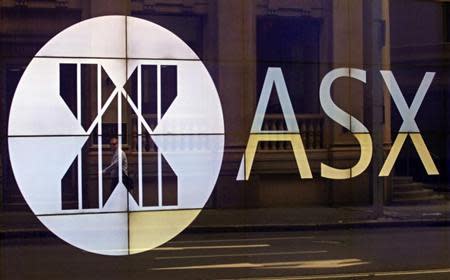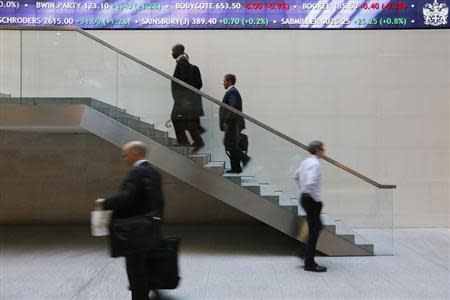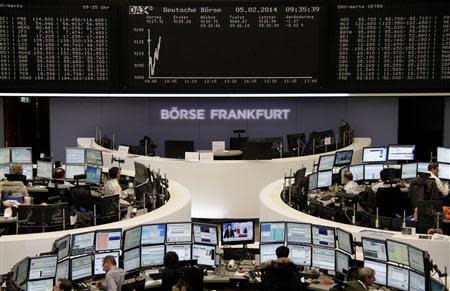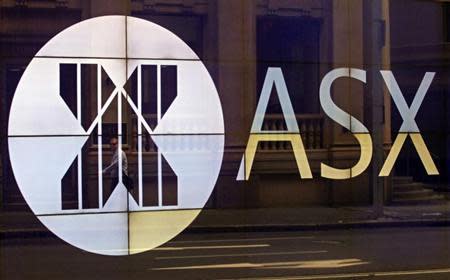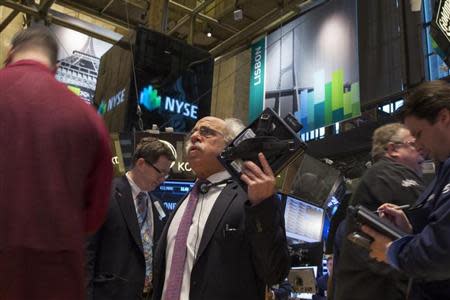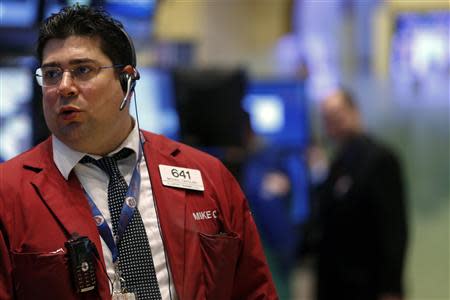World shares edge up after BOJ move, but data weighs
By Ryan Vlastelica NEW YORK (Reuters) - Stock markets around the world edged higher on Tuesday following a fresh round of stimulus from the Bank of Japan, though gains were limited by some tepid data following a recent rally, which also pushed the dollar down against the euro. The Bank of Japan maintained its expansionary monetary policy, extending special loan programs to help buoy economic growth. Japanese shares jumped 3.1 percent, but other markets in Asia were flat after China's central bank acted to rein in lending and Australia's central bank made hawkish comments about interest rates. "The move by the Bank of Japan is important as it shows how central banks around the world want to make sure economies don't slip back into recession," said Wayne Kaufman, chief market analyst at Rockwell Securities in New York. "That will be an overriding factor in any trading." The MSCI World index was up 0.3 percent. On Wall Street, U.S. stocks broadly rose as merger activity boosted confidence. Economic data pointed to continued struggles around the globe, with German investor sentiment weaker and factory activity in New York state slowing in February. Also in the United States, the National Association of Home Builders reported its index on homebuilder confidence fell in February to 46, indicating that a majority of builders see market conditions as poor. The data followed similarly weak reads last week on retail sales and the labor market. Investors have been looking to economic data to justify the recent advance in equities, which has taken the S&P 500 back near record levels even as the U.S. Federal Reserve has twice trimmed its stimulus program. The Fed's publication on Wednesday of the minutes of its latest meeting will be scoured by market participants for confirmation that the slowing will continue at a steady pace. "We're getting overbought in the short-term, so it wouldn't be surprising to see a pause in stocks, especially since some of the data has been lukewarm," Kaufman said. The Dow Jones industrial average was down 24.21 points, or 0.15 percent, at 16,130.18. The Standard & Poor's 500 Index was up 2.09 points, or 0.11 percent, at 1,840.72. The Nasdaq Composite Index was up 28.76 points, or 0.68 percent, at 4,272.78. The Nasdaq rose for an eighth straight day, its longest streak since July. The tech-heavy index was boosted by a jump in the shares of Tesla Motors Inc, which rose following a report that Apple Inc's mergers and acquisitions chief, Adrian Perica, met Tesla's chief executive, Elon Musk, last year, sparking speculation that Apple could be interested in buying the electric car maker. Tesla rose 2.8 percent to $203.70 after hitting an all-time high of $205.72. Apple rose 0.4 percent to $545.99. Forest Laboratories was the best performer on the S&P 500 after Actavis said it would acquire the specialty pharmaceuticals company in a cash and stock deal valued at about $25 billion. Forest Lab shares jumped 27.5 percent to $91.04 while Actavis shares rose 5.0 percent to $201.47. The benchmark 10-year U.S. Treasury note was up 9/32, with the yield at 2.7123 percent. In Europe, the pan-European FTSEurofirst 300 index closed with very slight gains. German Bund futures rose 0.2 percent, while Greek bond yields hovered around their lowest level since the country's debt restructuring as international lenders said they would return to Athens this week to assess the delivery of economic reforms. YEN LOSES GROUND The big loser from the BoJ action and subsequent bank-led Nikkei rally was the yen, which lost ground against all its major currency peers, with the dollar gaining 0.4 percent. The Japanese action helped "reverse the recent dollar/yen bear trend," said Tom Levinson, currency strategist at ING, adding that he thought 102.85/95 yen resistance would hold for now. The dollar fell against the euro to its lowest in seven weeks after the weak manufacturing data for New York state stoked uncertainty about the direction of the Federal Reserve's monetary policy. The euro rose to $1.3769, surpassing a key resistance of $1.3740 The U.S. dollar index, which measures the greenback against a basket of six currencies, fell 0.2 percent, while the euro rose 0.8 percent against the yen to post a new February high. After initially weathering a bout of profit-taking, gold slid from a near 3-1/2-month peak, shedding 0.5 percent. U.S. crude futures jumped 2.4 percent, boosted by robust demand for heating fuel, as well as a weaker dollar and supply disruptions in Libya. Brent crude rose 1.2 percent, topping $110 a barrel. (Editing by Leslie Adler)
